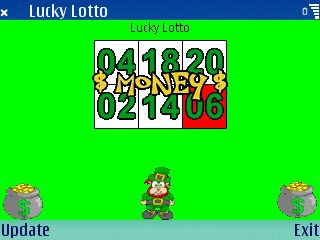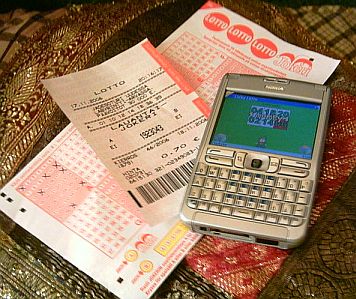Quality Control and the Lottery of buying a Smartphone Application
The number-picking application Lucky Lotto (I note it's not dignified with a hyperlink - Ed) is an awful piece of software. No one should buy it, not even the most ardent lottery fan.
So why is AAS writing an article about it? Well, because it's a perfect representation of one thing that's seriously wrong with online distribution of smartphone software at the moment: high quality is often too difficult to find amongst the low quality, the good stuff seems to be distributed almost at random among the bad stuff.
Lucky Lotto is very expensive for what it is, there's no demo, it doesn't do what it should, and the little it does do is done in a substandard way. In order to try the software legally the user has to pay for it up front, but once they've paid for it they will realise that they've bought a complete lemon and that they've totally wasted $9.95 (plus an extra $4.95 if they want to re-download it at any point in the future). If the same user goes through the same experience two or three times, they might never buy download apps again, weakening the entire industry.
The Beast Up Close
 Lucky Lotto is meant to pick your lottery numbers for you "based on the current astrological date and your date of birth". (Not that there's any such thing as a current astrological date, mind you...)
Lucky Lotto is meant to pick your lottery numbers for you "based on the current astrological date and your date of birth". (Not that there's any such thing as a current astrological date, mind you...)
Even before using it Lucky Lotto was an annoyance: it turned out to be a Java application rather than a Symbian one, despite being advertised as "for Symbian OS". Java apps can be great, but it would be nice if an app labelled as Symbian-based really was Symbian-based. Genuine Symbian OS apps running on Symbian OS phones are usually much faster and capable of using the phone's abilities fully, so for the app to claim to be Symbian-based when it's not is rather deceptive. It's a bit like labelling a PlayStation 1 game as a PlayStation 2 game: PS1 games will run on PS2 consoles thanks to backwards compatibility, but that doesn't make them PS2 games.
However, in the spirit of giving the app a fair shot, I went to the local newsagents with Lucky Lotto installed on my smartphone and asked it to pick my numbers. Alas, in its one genuine chance to fulfil expectations, the program fails. I entered the Finnish state lottery, which requires 7 numbers from 1 to 39, but Lucky Lotto only picks six numbers from 1 to 49. After adding another number and replacing a couple of the ones provided by the app because they were too large, I did eventually buy a ticket. If I do win, it will be partly down to three numbers I picked myself because the software was unable to. Quite why LL doesn't let you alter the range or number of "lucky numbers" is a mystery, it would be incredibly easy to program (hey, I once wrote a lottery number generator in about 10 minutes as an example program for others! - Ed) and is a very obvious feature to add. By contrast LL does have a totally utterly useless setting: you can have your lucky numbers calculated daily, or EVERY MINUTE. Quite why someone might want new lottery numbers every minute isn't explained. The author of this number picker application clearly put no thought at all into what a real person might actually need from a number picker.
Quite why LL doesn't let you alter the range or number of "lucky numbers" is a mystery, it would be incredibly easy to program (hey, I once wrote a lottery number generator in about 10 minutes as an example program for others! - Ed) and is a very obvious feature to add. By contrast LL does have a totally utterly useless setting: you can have your lucky numbers calculated daily, or EVERY MINUTE. Quite why someone might want new lottery numbers every minute isn't explained. The author of this number picker application clearly put no thought at all into what a real person might actually need from a number picker.
But perhaps I'm taking this too seriously, maybe there's a certain novelty fun factor to an app like this? Alas no, there's no sound or humour, all the fun you get for your $9.95 is a small two-frame animation of a dancing leprechaun and the word "Money" flashing across the middle of the screen at regular intervals like some kind of Monty Python outtake. I'm not sure whose money they're talking about: the end user's unlikely winnings, or the programmer's undeserved profits.
Even if there had been no problem about the numbers, for $9.95 I'd still expect more than just a number generator. Serious lottery fans would probably enjoy something like a diary of the times they won, an odds calculator, a countdown to the next draw, an alarm feature to remind them to buy or renew their ticket at regular intervals, or even some kind of very basic lottery syndicate tool. None of these features have to be complex, each one could probably be written in less than a day and wouldn't add significantly to development costs.
Simply spending time talking to regular players of the lottery would have revealed these kinds of needs amongst their potential customers, but there are no extra features at all in Lucky Lotto. I doubt the developers ever seriously considered how to make a commercial quality product instead of just a commercial product. It seems that all that crossed their mind was how to make it into an installable application that they could bung on the Internet as quickly and easily as possible. They were being amateurish in a field that should be about professionalism.
Why Lucky Lotto is worrying
 Lucky Lotto should never have been allowed on sale by its distributor. It would be of little or no value as freeware, but as a commercial app costing $9.95 (plus $4.95 for backup downloads) it's shockingly bad. The reason its sale is significant is because it backs up the view that quality control processes in smartphone software download stores are often broken or absent, with little done beyond simply checking that an app installs on compatible devices.
Lucky Lotto should never have been allowed on sale by its distributor. It would be of little or no value as freeware, but as a commercial app costing $9.95 (plus $4.95 for backup downloads) it's shockingly bad. The reason its sale is significant is because it backs up the view that quality control processes in smartphone software download stores are often broken or absent, with little done beyond simply checking that an app installs on compatible devices.
It's difficult to imagine that anyone who had the misfortune of buying Lucky Lotto would feel it was worth the price, or indeed any price. Rather than adding to the Symbian eco-system, this application is harming it by giving the whole concept of buying a third party application a bad name. Instead of getting a useful product, many users are feeling cheated by the low quality of what they buy, and smartphone software is generally devalued.
Some people seem to take the view that the more the merrier, that every release on a platform is good for that platform or distribution channel on the basis that people want more choice paying no thought for quality (yep - the numbers game, commented on by me last week! [bonus link!] - Ed). This extreme idea just doesn't stand up to close examination, particularly when there's no quality control at the seller's end and no demo at the buyer's end so any old rubbish can slip through unnoticed.
Imagine a book shop where many of the books only have a few pages, those pages have badly-written, poor quality text, and the books are cellophane sealed so they can only be skimmed after being bought. Also imagine that the bookshop itself makes no attempt to assess if a book is of reasonable quality before stocking it or pricing it. Would an increase in the number of these unchecked unopenable low quality books make sales at the bookshop increase, or decrease? Would potential customers feel more comfortable or less comfortable buying books from the shop if more and more of its titles were disappointing and impossible to preview before purchasing?
Software download channels have to make quality control and demo availability into top priorities, they cannot grow in the long or medium term off the backs of disappointed punters. A relationship has to be built up with customers if the application download industry is to survive, and part of the way to do that is by showing respect. It's disrespectful to customers to sell tat like Lucky Lotto, and the more this kind of rubbish makes it onto sales channels the fewer people will use those channels in the future.
The Growing Pains of Smartphone Software
It might be pointed out that successful retailers of established commercial media such as music, video and books also sell large amounts of dreck as well as high quality material. However, there are already trusted brands amongst the products they offer, so the average consumer has a number of good starting points when looking for high quality, which retailers usually emphasise when laying out or advertising their shops. There are also many trusted review sites and magazines covering products such as books, films, console games and music, so it's fairly easy to avoid complete turkeys as long as the medium or platform is well-established.
The smartphone software industry (Symbian, Windows Mobile and all the rest) isn't in this position yet, it's too young. Most of the best smartphone apps are published by independent companies that no one has heard of, and the same is true for most of its worst apps too. Because of this situation, it's very difficult for a potential smartphone software customer to get a handle on which developers genuinely make a good product and which are just peddling rubbish for a fast buck. After their first few disappointments these customers often just give up or else turn to piracy, and in either case the customers might as well not exist as far as funding new software goes.
It's been claimed that smartphone software is somehow too easy to write, but this is something of a red herring. There have always been contributions by talented amateurs, during the 1980s home computer software was so easy to write that many of the biggest-selling applications and games of the period were literally written by teenagers in their bedrooms. However, there was one crucial difference between those bedroom coders and the ones writing smartphone software now: the coders of the 1980s had their games reach customers through a large commercial publisher, who would only publish the good software and reject the bad. The software distributors of the time would also run quality control checks before deciding how many copies to order of a particular game or app, so there were two layers of filtering that software had to pass through before it could make it onto the shop shelves. Lucky Lotto would never have made it through either filter 20 years ago, so why is it available in online shops in 2006?
When it comes to selling smartphone software, reducing the number of low quality products would mean greater consumer confidence and higher sales of software in the future. Fewer customers would feel cheated, they'd find it easier to locate programs they actually want to buy, and they'd therefore be far more likely to make regular purchases. Tighter quality control in smartphone software retail channels is essential to create the kinds of steady revenue streams needed to make the platform healthy, it would reward good developers with sales and punish lazy ones with invisibility. Money would flow away from developing bad software and towards developing good software, which is exactly how things should be.
Rant over!
Krisse, for AAS, 18 Nov 2006
